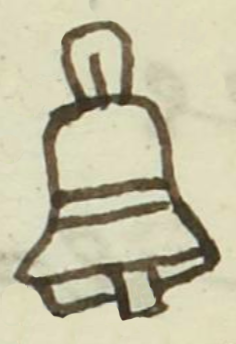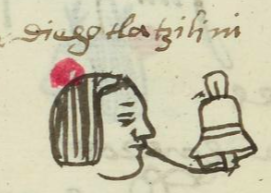Tlatzilini (MH566v)
This black-line drawing of the simplex glyph for the personal name Tlatzilini (“The Bell Rings,” attested here as a man’s name) shows a European-style bell tipping slightly to the left. Its clapper is showing at the base of the bell. The bell is flared at the bottom, and it has a horizontal stripe above the flare. At the top of the bell is a loop for hanging. The way the bell is tipped may suggest that it is about to ring, suggesting the verb tlatzilini, for a bell to ring.
Stephanie Wood
This type of European bell was a point of pride for some towns to acquire for their new temples, the Christian churches. The autonomous-era type of bells (coyolli), as shown on folio 44 recto of the Codex Mendoza (see below) has little sound scrolls coming out of the bottom. The coyolli (jingle bells) and oyohualli (also shown below) were usually small copper or gold bells. The loop at the top of this bell does coincide with the loop of some of the coyolli bells, which could hang from jewelry or from a leather thong around ankles, for instance, when danced. Juan José Batalla Rosado (2018, 96) includes the various glyphs related to the verbs tzilini and tzizlinia in his study of visual loans, given that the iconography of these bells has been greatly influenced by exposure to European bells. He also points to the new occupation of bell ringer and its seeming neologisms tlatzilini or tlatziliniani (2018, 97).
Stephanie Wood
diego tlatzilini
Diego Tlatzilini
Stephanie Wood
1560
Jeff Haskett-Wood
bells, campanas, suenan, campanillas, pinjantes, metales

tlatzilini, a bell rings, https://nahuatl.wired-humanities.org/content/tlatzilini
Suena la Campana
Stephanie Wood
Matrícula de Huexotzinco, folio 566v, https://www.loc.gov/resource/gdcwdl.wdl_15282/?sp=212&st=image
This manuscript is hosted by the Library of Congress and the World Digital Library; used here with the Creative Commons, “Attribution-NonCommercial-ShareAlike 3.0 License” (CC-BY-NC-SAq 3.0).







